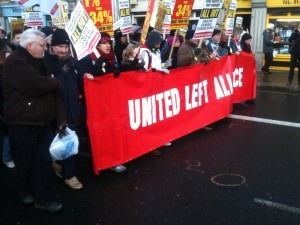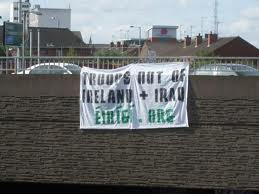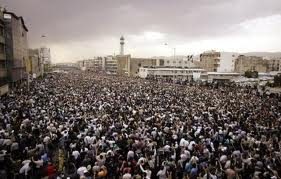 Hailing originally from Ireland where he was active in the Socialists Workers Party, Joe Carolan is a leading member of Socialist Aotearoa. Here he is interviewed by Ian Anderson (Wellington branch of Workers Party and The Spark editorial board).
Hailing originally from Ireland where he was active in the Socialists Workers Party, Joe Carolan is a leading member of Socialist Aotearoa. Here he is interviewed by Ian Anderson (Wellington branch of Workers Party and The Spark editorial board).
The Spark: Could you start by recapping what shifts happened in this year’s Irish General Election?
Joe: Well, to start with there was the complete electoral destruction of the favoured ruling class party Fianna Fail. They lost over 60 seats, including seats they’ve held since they first formed as a constitutional political party. In part this represents the death of nationalist illusions in the party, which had to do with their historical participation in the Civil War. The illusion of Fianna Fail as an upholder of national sovereignty was broken by their sell-out to the IMF and to neoliberalism in general.
Then you had the destruction of the Irish Green Party. The Green Party was exposed in two respects. Firstly they demonstrated that Green Parties are not automatically on the left, similar to Germany where the Greens helped to attack the working class and push through neoliberalism. They also sold out principles of their own, for example their craven surrender to Shell Oil, or the use of Shannon Airport by the US Military. So those two ruling parties lost a lot of ground, and good riddance.
There were significant gains by Fine Gael, the other major ruling class party. The split between the major ruling class parties does not go down left/right lines, and has more to do with the Civil War. Fine Gael came from the tradition of IRA leader Michael Collins, who accepted a free state with partition, while Fianna Fail is associated more with republicanism, the idea of a united Irish state.
Fine Gael is socially liberal, so many liberals treat it as a natural ally. The Labour Party has pursued a strategy of coalitions with Fine Gael.
Sinn Fein, a group broadly associated with left republicanism, has also gained seats – even, to their own surprise, in areas they have never previously held. They’ve grown from 4 seats to 13. The growth of Sinn Fein, the growth of the Irish Labour Party, and electoral support for the new United Left Alliance show a strong desire for change among the Irish working class.
The parties have not yet formed a coalition.
The Spark: What groups are involved in the United Left Alliance, and what is the basis for their unity?
Joe: To start with, it helps to understand that the United Left Alliance (ULA) didn’t exist four months ago. But the left in Ireland had been searching for unity. Not many workers understood why the left wasn’t coming together, as arguments over deformed workers states became increasingly irrelevant.
Left groups had managed to build several substantial movements, including the anti-war movement, and more community-based campaigns against bin charges and water charges.
The ULA is comprised of three key groups: the Socialist Party; the People Before Profit Alliance; the Workers and Unemployed Action Group.
The People Before Profit Alliance (PBPA) helped form some of those initial links. In particular there were key differences between the Socialist Workers Party, who formed the PBPA, and the Socialist Party. These were partly differences over the national question, but also about how the radical left could come together. The Socialist Workers Party thought the radical left needed to unite, to create a synergy and attract other groups, while the Socialist Party thought the time was not right. But you had people like Joan Collins leave the Socialist Party and join the PBPA: she became a key independent player.
Links were formed with community-based groups, such as the Workers and Unemployed Action Group. Members split from the Labour Party, and various independent socialists also joined.
The Spark: What are the key demands of the ULA?
Joe: Well, the ULA is not going for revolution as yet.
But they are making popular demands, which challenge the logic of the current system. In particular they’ve tapped into the fury about the banking system, by taking the position that the working class should not have to suffer from the private gambling debt of Irish banks. They’ve opposed bailouts and said this money should be invested in creating full employment. There is massive unemployment in Ireland right now, and massive emigration, and nothing coming from the major parties to stop the debt cycle.
Here their demand might not be possible under capitalism, but if not why not? There is a genuine discussion forming in Ireland about the need for a socialist economy.
The Spark: What alliances are the ULA likely to form, and what alliances do they oppose?
Joe: Well, in particular they oppose a coalition between Fine Gael and the Labour Party. This demand comes from the mass movement, with Unite Union and others calling for a coalition of leftists to resist any Labour Party coalition with the Blueshirts.
This leaves the possibility of a coalition between Sinn Fein, the Labour Party and the ULA. Now obviously Sinn Fein and the Labour Party have limitations. Sinn Fein in the North have been pushing through neoliberal policies, while the Labour Party has spent its whole career being “ashamed to be a pale shade of pink.”, in De Velera’s words. However, we have to ask why these two parties had such a growth in working class support this election. It’s obvious that many workers voted that way for the first time, and in some areas they voted for them as the only alternative.
Demanding a left coalition, rather than a Labour coalition with Fine Gael, will expose which side the Labour Party is on. Similar pressure should be exerted on Sinn Fein in the North. If they commit to Tory cuts, the Irish working class will see this betrayal. Many workers who voted for the Labour Party could in future vote for the ULA, or join it.
 The Spark: The Workers Party has paid some attention to the socialist republican group eirigi. What is their likely relation to the ULA?
The Spark: The Workers Party has paid some attention to the socialist republican group eirigi. What is their likely relation to the ULA?
Joe: Eirigi is an interesting formation. I’m a socialist republican myself, in the tradition of James Connolly and Jim Larkin. Eirigi will have to grapple with what methods they want to use. Irish republicanism has traditionally split between constitutional nationalism and armed struggle. Do they want to participate in elections? They have rejected armed struggle in the current conditions, but is that part of their long-term strategy? In any case they will need to grow their support base.
I would support their joining the ULA, though others would disagree. The ULA trajectory is open to other socialist groups and anyone serious about changing society, and in my view this ultimately means a workers’ republic.
The Spark: What kind of support do the newly elected TD’s have from the union movement?
Joe: This is the next really important step for the left in Ireland. The Labour Party has strangled the Irish union movement. So many European countries recently have had general strikes. In Ireland the workers movement is furious, and organizing huge marches: recently they’ve had marches of up to 130,000 workers. Branches of unions called for general strike. The trade union bureaucracy stifled these moves.
But the ULA has achieved legitimacy through its electoral victories, so leftists can no longer be dismissed as marginal ranters. With support from the working class, leftists can really challenge the bureaucracy and build a fighting union movement. Not just in the public sector unions where the Labour Party is dominant, but also among the masses of unorganized private sector workers.
The Spark: What is the international significance of a victory for the Irish left?
Joe: Well, it’s part of a revival for the hard left all over Europe. In Portugal you’ve got the Left Bloc, formed between two rival Trotskyist groups. In Greece there’s a growth across all the far-left groups, from the KKE to the Trotskyist led coalitions. In Germany, Die Linke is a big fixture. There have been general strikes throughout Europe, and growth not just in electoral formations. Ireland is now a part of that.
The lesson for the serious left in New Zealand is that long-term commitment pays off. During the Bin Tax battles, I remember getting up early at 530am in the morning in the rain, to carry bins to communal dumping zones, only to see coppers wade in and arrest our comrades, and I’d think “What are we doing?” But these victories in Ireland and elsewhere only happened because leftists didn’t give up, and we gained the loyalty of working class people in their communities.
There are several good socialist groups here in NZ, including the Workers Party, Socialist Aotearoa and the International Socialist Organisation. We’ve worked well together in Unite and through the Living Wage and Anti War campaigns. With that common work we’re starting to ask how we can move on from small groups of 30 or so in each city to the next stage, and we can learn from the movements in Ireland and elsewhere.
The Spark: What significance does the Irish left have for the United Kingdom generally?
Joe: Well, Ireland is not part of the UK! Northern Ireland is under occupation. Within the ULA I would advocate standing on a 32-county basis, and opposition to British imperialism, and if it means Protestants won’t vote ULA we can’t fudge that.
The idea of a united workers’ republic is back on the map, and leftists need to push it.
The Spark: Any other comments?
 Joe: We shouldn’t forget the importance of the revolution in the Middle East. It shows that revolution is possible, the effect of not simply going home after a mass march or a strike, but occupying central squares and buildings, and that is very infectious.
Joe: We shouldn’t forget the importance of the revolution in the Middle East. It shows that revolution is possible, the effect of not simply going home after a mass march or a strike, but occupying central squares and buildings, and that is very infectious.
The struggle doesn’t end when the votes are counted. Leftists should push for a general strike and bring the spirit of Cairo to Ireland.

Just another WordPress site